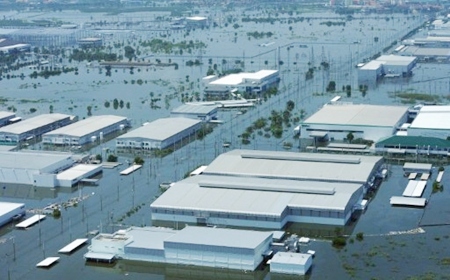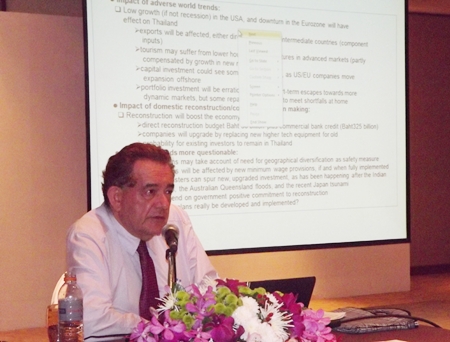|
Thai Industries Sentiment Index sinks to 26-month low in October

The Thai Industries Sentiment Index (TISI) in October
fell to 89.0 from 90.7 in September, hitting a 26-month low, due to the
country’s flood crisis, according to the Federation of Thai Industries
(FTI).
FTI Chairman Payungsak Chartsuthipol said the index, calculated based on a
survey of 732 industrial operators in 40 industries, dropped in terms of
purchase orders, total sales, production, and operating costs as a result of
Thailand’s worst recorded flooding.
The decline impacted the Thai economy overall, particularly the flood-hit
manufacturing sector, as industrial estates in the central provinces of
Ayutthaya and Pathum Thani as well as nearby areas were submerged. The
flooded industrial zones house major industrial production centers,
including automotive, automobile spare parts, electrical appliances and
electronic parts factories, which have been damaged by the inundation.
The flooding also affected the production of related industrial sectors,
employment and income of workers, according to the FTI. The statistical drop
reflected slow domestic consumption overall.
As the water clogged main roads disrupted or delayed goods deliveries,
disrupted traffic caused shortages of consumer products during the flooding.
According to the survey, entrepreneurs are concerned about post-flood
industrial rehabilitation, shortages of raw materials and possible price
hikes on raw materials.
The October index sliding below the benchmark of 100 means that industrial
operators felt pessimistic about their overall operations.
Meanwhile, the Thai Industries Sentiment Index in the next three months was
projected to edge up to 101.3, from the 94.0 forecast in the previous month.
However, Payungsak said that most entrepreneurs agreed that the government
should rebuild investor confidence by taking prevention measures against
possible flooding in the future, delaying implementation of the Bt300/day
minimum wage, speeding up relieving flood-stricken industrial manufacturers,
resolving labor shortages, providing low-interest loan sources for the
affected operators and dealing with the shortages and rising prices of raw
materials. (MCOT)
|
|
 |
Inundated Ayutthaya industrial estate to be dry by Nov 25
The flooded Hi-Tech Industrial Estate in Ayutthaya is
expected to resume operations following natural drainage and pumping by Nov
25.
Officers of various agencies including the industrial park itself, the Thai
army, and the Royal Irrigation Department have been draining water from site
since Nov 8. The water level there has receded from 4.9m to about 4m, of
which 60cm subdued naturally.
Currently some 6.5 million cubic meters of floodwater were left at Hi-Tech.
According to military personnel the water is expected to be completely
drained by Nov 25 with the pumps removing about 800,000 cubic meters/day.
Hi-Tech Industrial Estate has been under water since Oct 13. Covering over
2,400 rai of land, it has 143 plants and provides employment for more than
51,000 workers with an investment of around Bt65 billion.
Thirty percent of the plants are for electric appliances, electronic items
and scientific equipment. Other types of businesses include rubber, plastic,
artificial leather, machinery, spare parts, steel and other metals, as well
as motor vehicles. (MCOT)
|
|
 |
Cabinet approves debt moratorium for
low-income earners
Thailand’s Cabinet last week approved a debt moratorium
for farmers and low-income earners with outstanding debts lower than
Bt500,000, according to Deputy Finance Minister Boonsong Teriyapirom.
The project is intended to alleviate the financial problems of this segment
of the public and aims to help them to use money wisely to rehabilitate
their families and restore their well-being.
The debt moratorium will apply to customers of the Bank for Agriculture and
Agricultural Co-operatives (BAAC) and the bank’s customers in the
violence-impacted southern provinces of Yala, Pattani and Narathiwat. It
includes customers using the services of the Government Savings Bank, the
Small- and Medium-Enterprise Development Bank of Thailand (SME Bank), the
Government Housing Bank (GH Bank), the Islamic Bank of Thailand, and the
Secondary Mortgage Corporation, whose debts are non-performing loans (NPLs)
or debts arising from debt restructuring.
Debtors must as well be in the Personal Income Tax system, while each must
have their initial loans altogether in financial institutions of no more
than Bt500,000 as of June 30 of this year.
Boonsong said 12.48 percent, or 775,090 of all accounts fall in this
category for the six institutions above, with outstanding debts of about
Bt90.5 billion, or 5.76 percent of the overall outstanding debts of these
banks.
The project will allow the debt moratorium of both initial loans and
interests for three years, from Oct 1 this year to Sept 30, 2014. Once the
project is finished, customers will start paying their debts according to
new debt plans made by the six financial institutions.
During the suspension period, debtors cannot request further loans from the
institutions but they can leave the project before the three-year period.
They will also be offered vocational training programs according to their
geographic location and knowledge, as organized by the Finance Ministry and
related agencies.
Bank customers eligible to participate in the program could register at all
six financial institutions beginning Nov 15, while the registration and
selection process will last for three months. (MCOT)
|

|
AFG looks at tomorrow, and the next year

Chris Bruton presents his
mini-seminar entitled, “What’s up (and down) in the world today (and
implications for Thailand).”
Dr. Iain Corness
The Automotive Focus Group (AFG) held a very successful
and popular mini-seminar entitled, “What’s up (and down) in the world today
(and implications for Thailand)” given by the always erudite Chris Bruton
from Dataconsult.
After introduction from the AFG President James Beeson,
Chris Bruton presented an overview of the world economics and pointed out
that growth was expected to continue, though this would be weaker than
previously anticipated in 2011 and 2012. He also presented tables to show
that world GDP growth was expected to be around three percent, but in the
developing countries it was expected to be between five and six percent.
The European debt crisis would affect the rest of the
world, which is why the Eurozone could not afford to let Greece go to the
wall, and he did put forward the concept that perhaps the developed nations
could not really afford the aid programs they have been giving. With China
exporting to the US, there may be a slowing there, which will adversely
affect America, and then with flow-ons go to other developed nations. A
commodity downturn is expected. There is a very delicate balance in
international trade versus international aid.
Developing countries which have high exports as a share
of GDP will then be high risk, and this includes Malaysia at 110 percent,
and to a lesser extent Thailand at 69 percent. Fortunately, Thailand has a
low debt expressed as a percentage of GDP. He discounted Africa as being a
major player at this stage, despite the raw materials, saying whimsically,
“If they had socks, they would have to pull them up.”
Chris Bruton gave the opinion that next year for
Thailand, “Is not looking bad. We are in a better position than many, though
tourism will suffer because of lower levels of household wealth overseas.”
He gave the view that the post-flood reconstruction will benefit the
economy, though the proposed increase in the minimum wage will not.
He concluded by saying that the outlook for the US and
Eurozone will be challenging. For Thailand it will have the double
challenges of the western world and our own reconstruction. “Will the
political will be enough?” he asked, in this situation of conflict.
His final words contained the Chinese curse, “May you
live in interesting times!”
The AFG once again showed it is a very viable grouping amongst the
automotive industry, presenting interesting and thought-provoking items at
its meetings. People within the industry who may be interested in finding
out more about the AFG can contact the secretariat through
[email protected].
|

|
|

